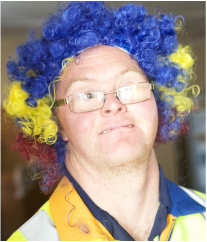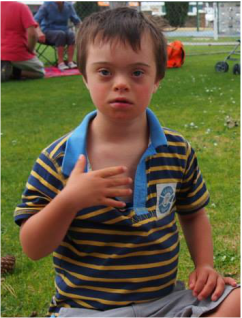down syndrome and your baby

This is a great general summary of what having a baby with Down Syndrome may mean. It is written by and reproduced from the Down Syndrome Victoria website.
As with all people, people with Down syndrome vary in their looks, personalities, intellect, likes, and dislikes. Today, more than ever before, people with Down syndrome have the best opportunity, with varying degrees of support, to lead ordinary lives in their community.
Having an intellectual disability
Down syndrome is the most common known cause of intellectual disability. Some degree of intellectual disability is the only feature that is present in all individuals with Down syndrome – everyone with Down syndrome will experience some delay in their development, and some level of learning difficulty. There are however significant differences between individuals. While some people with Down syndrome may need relatively little support to lead an ordinary life, others may require a significant level of support to attain basic living skills. We cannot ascertain or predict at birth the degree of intellectual disability – nor the way in which this may impact on the life of the individual. Down syndrome affects, but does not determine development. What happens after birth will be more important in shaping the outlook for a person with Down syndrome, than the occurrence of the extra chromosome at conception. Just like everyone else, the development of individuals with Down syndrome is significantly influenced by family, environment, cultural and social factors.
People with Down syndrome can usually understand a great deal more than they can express verbally, and often their abilities are underestimated based on their language ability. While many people with Down syndrome speak fluently and clearly, a large number will benefit from speech and language therapy in order to attain good language articulation and communication skills. A minority of people with Down syndrome find it very difficult to acquire language skills and/or speak clearly – this may be compounded by hearing loss.
As with all people, people with Down syndrome vary in their looks, personalities, intellect, likes, and dislikes. Today, more than ever before, people with Down syndrome have the best opportunity, with varying degrees of support, to lead ordinary lives in their community.
Having an intellectual disability
Down syndrome is the most common known cause of intellectual disability. Some degree of intellectual disability is the only feature that is present in all individuals with Down syndrome – everyone with Down syndrome will experience some delay in their development, and some level of learning difficulty. There are however significant differences between individuals. While some people with Down syndrome may need relatively little support to lead an ordinary life, others may require a significant level of support to attain basic living skills. We cannot ascertain or predict at birth the degree of intellectual disability – nor the way in which this may impact on the life of the individual. Down syndrome affects, but does not determine development. What happens after birth will be more important in shaping the outlook for a person with Down syndrome, than the occurrence of the extra chromosome at conception. Just like everyone else, the development of individuals with Down syndrome is significantly influenced by family, environment, cultural and social factors.
People with Down syndrome can usually understand a great deal more than they can express verbally, and often their abilities are underestimated based on their language ability. While many people with Down syndrome speak fluently and clearly, a large number will benefit from speech and language therapy in order to attain good language articulation and communication skills. A minority of people with Down syndrome find it very difficult to acquire language skills and/or speak clearly – this may be compounded by hearing loss.

Living an ordinary life
People with Down syndrome are not fundamentally different from anyone else. They have the same needs and aspirations in life that we all do, including somewhere to live, meaningful employment, the opportunity to enjoy the company of friends and family, intimacy and having a role in their community. However, the path to achieving these goals can be more complex than for most people, and most people with Down syndrome are likely to need some level of support to help them achieve the kind of life that most people take for granted.
Segregation from the rest of the community and low expectations have combined in the past to hinder and limit the development and achievement of people with Down syndrome. Today we recognise that growing up in their families and their communities, with the same rights and responsibilities as everyone else, is vital to the development of people with Down syndrome. It is easy to see that the future for the adults of today who have grown up in families and communities will be significantly different to those who lived their lives in institutionalised care, with limited opportunities for learning and personal growth. Given the same opportunities as everyone else to realise their full potential, people with Down syndrome are proving themselves determined and competent to lead full lives as valued and productive members of their families and the general community.
People with Down syndrome are not fundamentally different from anyone else. They have the same needs and aspirations in life that we all do, including somewhere to live, meaningful employment, the opportunity to enjoy the company of friends and family, intimacy and having a role in their community. However, the path to achieving these goals can be more complex than for most people, and most people with Down syndrome are likely to need some level of support to help them achieve the kind of life that most people take for granted.
Segregation from the rest of the community and low expectations have combined in the past to hinder and limit the development and achievement of people with Down syndrome. Today we recognise that growing up in their families and their communities, with the same rights and responsibilities as everyone else, is vital to the development of people with Down syndrome. It is easy to see that the future for the adults of today who have grown up in families and communities will be significantly different to those who lived their lives in institutionalised care, with limited opportunities for learning and personal growth. Given the same opportunities as everyone else to realise their full potential, people with Down syndrome are proving themselves determined and competent to lead full lives as valued and productive members of their families and the general community.

Being an individual
One of the greatest challenges that people with Down syndrome may encounter is community ignorance and labeling based on an outdated stereotype of what it means to have Down syndrome. Despite much change there is still a tendency to focus on the label ‘Down syndrome’ and not on the individual. People with Down syndrome are each unique, with their own talents, abilities, thoughts and interests. People with Down syndrome will have individual strengths and weaknesses just like everyone else – while one may excel in artistic pursuits but struggle with basic mathematics or literacy, another might outperform their peers without a disability in culinary skills but struggle with communicating clearly. Family passions and skills are also likely to be reflected in people with Down syndrome, as they may be in other members of the family.
People with Down syndrome do not all look alike. Despite the array of physical characteristics associated with Down syndrome, there is large variation in how many of these features an individual may have and their prominence. People with Down syndrome look more like other people in their own family than they look like others with Down syndrome. Importantly, there is no correlation between the physical features associated with Down syndrome and intellectual ability.
Another common misconception is that all people with Down syndrome are happy and affectionate. People with Down syndrome have the same emotional range as everyone else. They get happy, sad, embarrassed, frustrated, thoughtful and fall in and out of love, just as we all do. They may, however, have difficulty in expressing their feelings verbally which can cause frustration and lead to expressing feelings through behaviours.
One of the greatest challenges that people with Down syndrome may encounter is community ignorance and labeling based on an outdated stereotype of what it means to have Down syndrome. Despite much change there is still a tendency to focus on the label ‘Down syndrome’ and not on the individual. People with Down syndrome are each unique, with their own talents, abilities, thoughts and interests. People with Down syndrome will have individual strengths and weaknesses just like everyone else – while one may excel in artistic pursuits but struggle with basic mathematics or literacy, another might outperform their peers without a disability in culinary skills but struggle with communicating clearly. Family passions and skills are also likely to be reflected in people with Down syndrome, as they may be in other members of the family.
People with Down syndrome do not all look alike. Despite the array of physical characteristics associated with Down syndrome, there is large variation in how many of these features an individual may have and their prominence. People with Down syndrome look more like other people in their own family than they look like others with Down syndrome. Importantly, there is no correlation between the physical features associated with Down syndrome and intellectual ability.
Another common misconception is that all people with Down syndrome are happy and affectionate. People with Down syndrome have the same emotional range as everyone else. They get happy, sad, embarrassed, frustrated, thoughtful and fall in and out of love, just as we all do. They may, however, have difficulty in expressing their feelings verbally which can cause frustration and lead to expressing feelings through behaviours.
Some medical and health matters
As recently as the 1950s, life expectancy for individuals with Down syndrome was as low as 15 years of age. Advances in medical and social science research have completely altered the quality of health and life enjoyed by people with Down syndrome in recent times. The majority of individuals with Down syndrome will today enjoy a long and healthy life.
People with Down syndrome often have lowered general immunity compared to the general population. This means that they may be more susceptible to infections and common ailments, especially in early childhood. However, a diagnosis of Down syndrome does not mean not being able to live a healthy life. Some people with Down syndrome are very fit and healthy, others may have more health issues than most.
There are some common health issues and some more serious medical conditions which are more likely to occur in people with Down syndrome than in the general population. Regular health checks and ongoing monitoring of some specific issues are advisable but, generally speaking, people with Down syndrome can remain fit and healthy if they lead a healthy lifestyle.
Keeping fit and getting regular exercise is important. Research suggests that people with Down syndrome burn fewer calories in doing the same activities as the general population. This means that even with a healthy eating regime there can be a tendency for both children and adults with Down syndrome to become overweight. An active lifestyle with plenty of physical activity helps to counterbalance this tendency and encourages general health and fitness.
With appropriate health and education services, and with the support and opportunities available today, people with Down syndrome can look forward to long and fulfilling lives as valued contributing members of their families and the broader community.
As recently as the 1950s, life expectancy for individuals with Down syndrome was as low as 15 years of age. Advances in medical and social science research have completely altered the quality of health and life enjoyed by people with Down syndrome in recent times. The majority of individuals with Down syndrome will today enjoy a long and healthy life.
People with Down syndrome often have lowered general immunity compared to the general population. This means that they may be more susceptible to infections and common ailments, especially in early childhood. However, a diagnosis of Down syndrome does not mean not being able to live a healthy life. Some people with Down syndrome are very fit and healthy, others may have more health issues than most.
There are some common health issues and some more serious medical conditions which are more likely to occur in people with Down syndrome than in the general population. Regular health checks and ongoing monitoring of some specific issues are advisable but, generally speaking, people with Down syndrome can remain fit and healthy if they lead a healthy lifestyle.
Keeping fit and getting regular exercise is important. Research suggests that people with Down syndrome burn fewer calories in doing the same activities as the general population. This means that even with a healthy eating regime there can be a tendency for both children and adults with Down syndrome to become overweight. An active lifestyle with plenty of physical activity helps to counterbalance this tendency and encourages general health and fitness.
With appropriate health and education services, and with the support and opportunities available today, people with Down syndrome can look forward to long and fulfilling lives as valued contributing members of their families and the broader community.